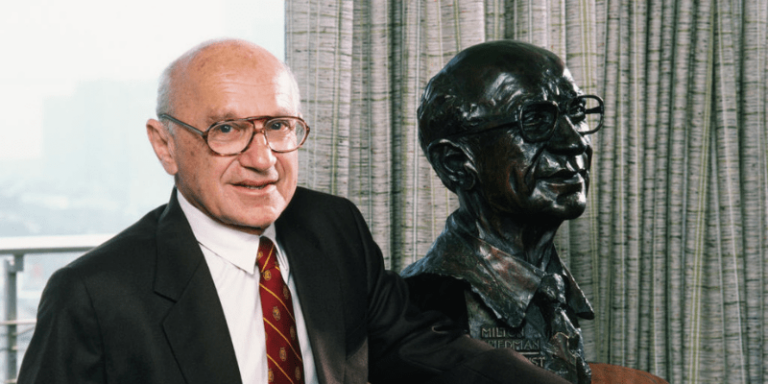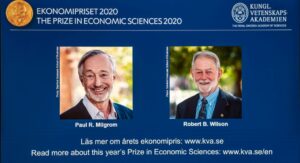The Nobel Prize in Economics
The Nobel Econ Prize has awarded a diverse group of financial scientists.
By: Andrew Moran | October 14, 2020 | 427 Words

Nobel Prize-winning economist Milton Friedman poses with a sculpture of himself during a 1986 San Francisco, California, photo portrait session. (Photo by George Rose/Getty Images)
In recent years, the young generation has shown a huge interest in the field of economics. Once considered a boring subject, economics is now easier to understand than ever before. Whether it is via YouTube or the Khan Academy, leading experts have sparked curiosity for economics among the hip cool kids. As a result, the winner of the Nobel Prize in Economics is under the spotlight. So, what is the prize all about, and who was victorious in 2020?
Nobel Prize in Economics: A Primer
In 1968, Sweden’s central bank (Sveriges Riksbank) created the Prize in Economic Sciences. The prize is awarded by The Royal Swedish Academy of Sciences, using the same principles as for the other Nobel Prizes. The first Nobel Prize in Economics was awarded to Ragnar Frisch and Jan Tinbergen in 1969 for “having developed and applied dynamic models” to analyze economics. Today, recipients get more than $1 million in prize money.

(Xinhua/Wei Xuechao via Getty Images)
Who Won in 2020?
Paul R. Milgrom and Robert B. Wilson, two professors at Stanford University, won the prize in 2020. Milgrom and Wilson were chosen for helping make auctions run more efficiently to benefit sellers, buyers, and taxpayers worldwide.
The two Americans are pioneers of auction theory, a branch of economics that looks at how people act in auction markets. They tried to discover how to make auctions run more efficiently. They studied why bidders tend to place bids below their own estimate of an item’s value. This suggested that the product sells for less than what it is worth and not to the buyer who wants it the most. The economists’ work will offer guidance on how to price and allocate scarce goods.
Notable Past Winners
In total, 52 Nobel Memorial Prizes in Economic Sciences have been given to 86 people. Here are some noteworthy recipients:
- Friedrich Hayek (1974):With Gunnar Myrdal, Hayek pioneered the theory of money studies and analysis.
- Milton Friedman (1976):He was celebrated for his studies in monetary history. He looked at theory to do with stabilizing the economy, as well as patterns of economic consumption.
- Paul Krugman (2008):He won for analyzing the geography of economic activity.
What is Economics?
While the public thinks economists have a crystal ball to predict the future, economics is a science that follows basic laws and principles. Like other science fields, economics has various branches. The Nobel Committee has become a controversial group in recent years, but the list of winners in economic science is intellectually diverse and specializes in different areas.
















